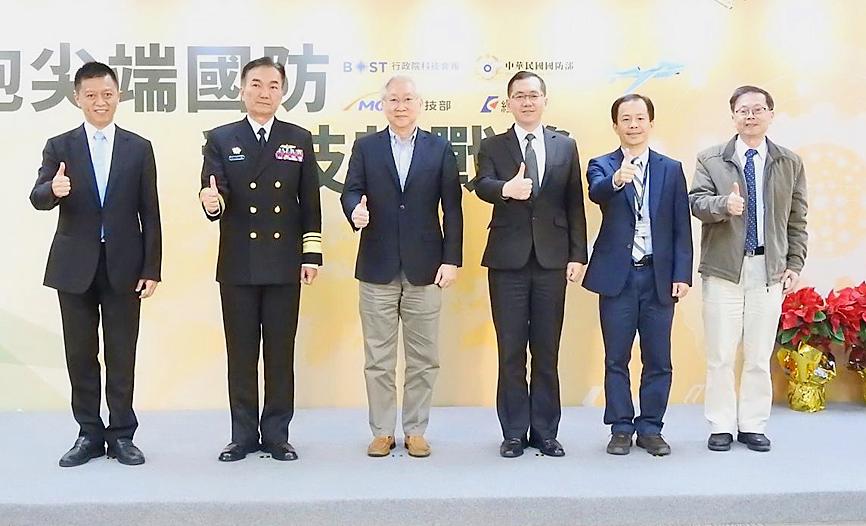The government is to budget NT$5 billion (US$175.6 million) over the next five years to promote a program on the research and development (R&D) of defense technologies at local universities, the Ministry of Science and Technology and the Ministry of National Defense announced yesterday.
The program prioritizes seven research areas: information and communications technology and smart technology; key system analysis and integration; advanced sensors and precision manufacturing; advanced propulsion systems and aerial vehicles; advanced system engineering; advanced vessels and underwater vehicles; and new material and mechanics research, the science ministry said in a news release.
The two ministries would each contribute half of the budget, Executive Yuan Office of Science and Technology Deputy Executive Secretary Andrew Yeh (葉哲良) told a news conference in Taipei.

Photo: Yang Mien-chieh, Taipei Times
In the past, defense technology was mainly developed to meet the needs of the military’s army, navy or air force branches, but now emphasis is increasingly being placed on information security and robotics amid growing demand for civilian applications and interdisciplinary talent, Yeh said.
While the military-affiliated Chungshan Institute of Science and Technology has its own information security projects, it is less sensitive to new trends in academia, and the program aims to fortify its connections, he said.
Giving an example, Yeh said that very few countries are capable of making advanced lithium batteries used in submarines and hopefully Taiwan could be among the top five countries that can produce them.
The two ministries plan to recruit 150 graduate students over five years, with each student receiving a monthly grant of NT$30,000 to NT$60,000, he said.
Foreign students cannot join the program, he added.
Universities interested in the program can submit applications to the science ministry by Tuesday, he said, adding that the ministry plans to select three to six schools to establish research centers for the program.
The promulgation of the Defense Industry Development Act (國防產業發展條例) last year shows the need for more long-term talent cultivation programs in the coming decades, Minister of Science and Technology Wu Tsung-tsong (吳政忠) said.
Technologies related to artificial intelligence, 5G and even 6G communications, Internet of Things, as well as quantum computing, are key to defense technology development, Wu said, encouraging students to study in the related fields.
The defense ministry has over the past two months met with faculty and students at National Taiwan University and National Cheng Kung University to promote defense technology, Deputy Minister of National Defense Vice Admiral Lee Tsung-hsiao (李宗孝) said.
Many experts on defense technology have worked at the Chungshan institute, while students in the new program would also be able to seek employment in the private sector, he said.

Taiwan has received more than US$70 million in royalties as of the end of last year from developing the F-16V jet as countries worldwide purchase or upgrade to this popular model, government and military officials said on Saturday. Taiwan funded the development of the F-16V jet and ended up the sole investor as other countries withdrew from the program. Now the F-16V is increasingly popular and countries must pay Taiwan a percentage in royalties when they purchase new F-16V aircraft or upgrade older F-16 models. The next five years are expected to be the peak for these royalties, with Taiwan potentially earning

STAY IN YOUR LANE: As the US and Israel attack Iran, the ministry has warned China not to overstep by including Taiwanese citizens in its evacuation orders The Ministry of Foreign Affairs (MOFA) yesterday rebuked a statement by China’s embassy in Israel that it would evacuate Taiwanese holders of Chinese travel documents from Israel amid the latter’s escalating conflict with Iran. Tensions have risen across the Middle East in the wake of US and Israeli airstrikes on Iran beginning Saturday. China subsequently issued an evacuation notice for its citizens. In a news release, the Chinese embassy in Israel said holders of “Taiwan compatriot permits (台胞證)” issued to Taiwanese nationals by Chinese authorities for travel to China — could register for evacuation to Egypt. In Taipei, the ministry yesterday said Taiwan

Taiwan is awaiting official notification from the US regarding the status of the Agreement on Reciprocal Trade (ART) after the US Supreme Court ruled US President Donald Trump's global tariffs unconstitutional. Speaking to reporters before a legislative hearing today, Premier Cho Jung-tai (卓榮泰) said that Taiwan's negotiation team remains focused on ensuring that the bilateral trade deal remains intact despite the legal challenge to Trump's tariff policy. "The US has pledged to notify its trade partners once the subsequent administrative and legal processes are finalized, and that certainly includes Taiwan," Cho said when asked about opposition parties’ doubts that the ART was

If China chose to invade Taiwan tomorrow, it would only have to sever three undersea fiber-optic cable clusters to cause a data blackout, Jason Hsu (許毓仁), a senior fellow at the Hudson Institute and former Chinese Nationalist Party (KMT) legislator, told a US security panel yesterday. In a Taiwan contingency, cable disruption would be one of the earliest preinvasion actions and the signal that escalation had begun, he said, adding that Taiwan’s current cable repair capabilities are insufficient. The US-China Economic and Security Review Commission (USCC) yesterday held a hearing on US-China Competition Under the Sea, with Hsu speaking on